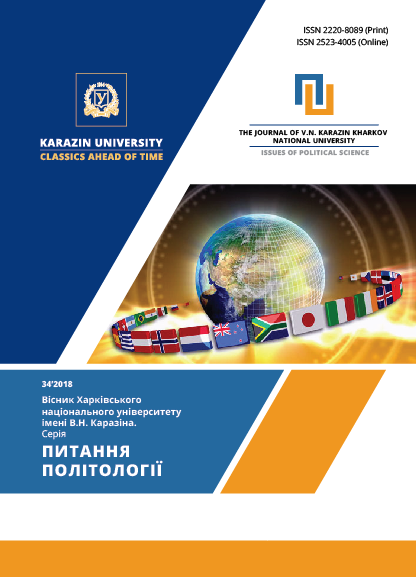LOCAL ELECTIONS TO REGIONAL AND CITY COUNCILS: COMPARATIVE ANALYSIS OF RESULTS
Abstract
The results of elections to regional councils and city councils of regional centers in 2015 in Ukraine are analyzed in the context of transformation of the electoral system. The paper is mainly focused on such indicators as the percentage of votes received, the number and percentage of deputy seats received in the respective councils. Additionally, such indicators as the number of local party organizations that passed to the relevant councils are analyzed; the all-Ukrainian statistics regarding the share of mandates received by concrete parties, as well as the frequency with which particular parties earned the first place in the number of mandates received in each of the councils is summarized. Uprising regionalization of political system in Ukraine caused by growing role of local leaders and their power to influence political processes in regions is defined. The results obtained are compared at the level of regional councils and city councils of regional centers, as well as between political parties of different levels. The conclusion on effectiveness of local political parties in comparison to large national ones in the regions is made. There are «parties of cities» and «parties of regions», which significantly differ in their level of support within the regional centers and regions in general; parties with a relatively common level of support are determined as well. In terms of aggregated indicators, it is concluded that city councils of regional centers are more successful ones for ballot strategies from non-parliamentary parties; on the other hand, parliamentary parties give a significant advantage to their representatives at the level of regional elections. In such circumstances, respectively, candidates need different strategies for elections to city councils of regional centers and regional councils; in many cases, the winning strategy was to run from the party, which was represented by the current mayor or another local candidate with sufficient support and resource support. The paper points the weakening of traditional geopolitical conflicts for Ukraine, which are replaced by more fragmented oppositions - for example, at the regional level.
Downloads
References
Закон України про місцеві вибори 2015. URL: http://zakon3.rada.gov.ua/laws/show/595-19 (дата звернення: 11.11.2018).
Центральна виборча комісія. URL: http://www.cvk.gov.ua/ (дата звернення: 22.11.2018).
Кандидати, яких обрано депутатами рад. URL: http://www.cvk.gov.ua/pls/vm2015/PVM002? PT001F01=100&pt00_t001f01=100 (дата звернення: 22.11.2018).
Author’s copyright and licensing.
License Terms: Authors retain copyright and also grant the Journal the right to publish original scientific articles that contain research results and are not under consideration for publication in other issues. All material is licensed under a Creative Commons Attribution License International CC-BY, which allows others to distribute their work with the copyright of this work and recognition of the first publication in this Journal.
If the article is taken for publishing in The Journal of V.N. Karazin Kharkiv National University. “Political Science Issues”, the author must sign a copyright transfer agreement. The agreement is sent by post (original document) or by e-mail (scanned copy of the document) to the Editorial Board of the Journal.
By this agreement the author certifies that the submitted material:
- does not violate the copyrights of other people or organizations;
- has not been previously published in other issues and has not been given for publishing to other issues.
The author gives the editorial board the rights to:
- publish the article in Ukrainian (English) and distribute its printed version;
- translate the article into English (for articles in Ukrainian) and distribute the printed version of the translation;
- distribute the electronic version of the article, as well as the electronic version of the English-language translation of the article (for articles in Ukrainian and Russian), through any electronic means (placing on the official journal web site, in electronic databases, repositories, etc.).
The author reserves the right without the consent of the editorial board and the founders to:
- Completely or partly use the materials of the article for educational purposes.
- Completely or partly use the materials of the article for writing own theses.
- Use the materials of the article to prepare abstracts, conference reports, and oral presentations.
- Post electronic copies of the article (including the final electronic version downloaded from the journal's official website) to:
- personal web-resources of all authors (web sites, web pages, blogs, etc.);
- web-resources of institutions where authors work (including electronic institutional repositories);
- non-profit, open-source web resources (such as arXiv.org).




